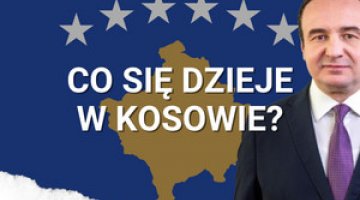Elections in Kosovo – a shaky stabilisation
Early parliamentary elections were held on 12 December in Kosovo and were expected to end the political crisis that has been ongoing there since September this year. However, the way in which the election campaign was conducted and the results of the vote have increased the political polarisation and revealed a bitter conflict between the major political forces in Kosovo. In the EU’s opinion, the elections generally were held in compliance with democratic standards and in a relatively calm atmosphere, which is a success of the Kosovar administration and proof of the increasing strength of this young state. Nevertheless, some parties and non-governmental organisations have indicated numerous irregularities and forgeries at the time of vote casting. This may provide grounds for questioning the result of the elections and the democratic legitimacy of the future government. The Democratic Party of Kosovo (PDK) led by Prime Minister Hashim Thaci, which according to the initial results won the elections (33.5% of the votes) has little chance of forming a stable government. This will make it difficult to start negotiations and to normalise relations with Serbia, which is vital for Kosovo’s integration with the EU and for overcoming the state’s economic problems.
The election campaign has exacerbated political conflicts
The early parliamentary elections were expected to end the political crisis in Kosovo. The crisis started in September when Fatmir Sejdiu stepped down as president. He is linked to the Democratic League of Kosovo (LDK), which co-formed the government before the elections. His resignation added fuel to the conflict inside the LDK-PDK coalition (formed under pressure from the international community shortly before Kosovo proclaimed its independence) and led to the government’s fall. Prime Minister Thaci hoped that the early elections would enable his party to reinforce its position and to form a government by itself.
There is a broad consensus on domestic and foreign policy priorities among Kosovar political parties. All of them want a more rapid economic development, efficient combating of corruption and unemployment and accession to the EU and NATO as soon as possible. The main causes of the deep divides within the political elite of Kosovo are the high personal ambitions of individual politicians and a tendency to think only in terms of the interests of their parties. The organisation of political parties at various levels fits in with the clan-based structure of society. The election campaign has additionally worsened the existing divides.
Most parties waged negative campaigns, focusing on criticising Prime Minister Thaci and his party, and trying to take advantage of growing public discontent. PDK leaders were blamed for the lack of progress in building efficient state institutions, for the poor economic condition and, most of all, for the highest level of corruption and nepotism in the Balkans. A new party, Vetevendosje (Self-Determination), originated from an anti-establishment student protest movement led by Albin Kurti, was especially critical about the government’s activity. It is objecting to negotiations with Serbia and is calling for an end to the international protectorate in Kosovo. It is also criticising the concessions made to Kosovar Serbs.
The election results
Citizens of Kosovo elected 120 Members of Parliament (including ten representatives of Kosovar Serbs and ten of other minorities). According to initial results, PDK has achieved a result comparable to that in the preceding elections in 2007 and has no chance of ruling by itself. LDK under the new leadership of Isa Mustafa, the popular mayor of Pristina, also received a similar level of support as in 2007 (23.6%). The third strongest political party in the country is now Vetevendosje, for which 12.2% of votes were cast. However, it did not manage to capitalise to a sufficient extent on the public discontent and achieved a result which was much below the level of support it could have expected on the basis of opinion polls before the elections. Two other parties also crossed the 5% electoral threshold: the Alliance for the Future of Kosovo (AKK), with 10.8% of the vote, and the New Kosovo Alliance (AKR), with 7.1%. The low turnout (47.8%) reflects increasing public fatigue with the political elite, who are perceived as corrupt and incapable of resolving the country’s problems. However, this low turnout turned out to be to the benefit of PDK and LDK, which managed to mobilise their supporters and thus achieved good results.
The chances for stabilisation are low
The chances for overcoming the political crisis soon and the establishment of the state authorities are low due the lack of a clear winner in the elections, the limited coalition options PDK has and the fact that the election results are in question. Prime Minister Thaci will make efforts to form a government with support from the groupings representing national minorities and one of the smaller parties (e.g. AKR). A government built on such a political base will have only a small parliamentary majority. The strong opposition is likely contest most of its moves.
The position of PDK, and consequently that of the government, may also be undermined due to suspicions of election fixing and corruption. Although the election process in general was evaluated positively by EU observers, some irregularities were reported in Drenica region, the cradle of PDK. This is very likely to lead to the opposition parties calling into question the election results being and thus PDK’s victory. Moreover, the European Union’s EULEX mission is conducting over 120 investigations into suspected corruption of senior state officials (the director of Kosovo’s Central Bank was arrested this June, and corruption charges have also been brought against the minister of transport and communication). The EULEX mission’s activity meets halfway the expectations of the public. However, an intensification of such activities may seriously weaken Prime Minister Thaci’s party.
Divides among Serbs in Kosovo
The elections confirmed the existence of deep divides in the Serb community in Kosovo, which numbers approximately 120,000 people. Considering the process of integration with the EU, the government in Belgrade avoided openly appealing to Serbs for a boycott of the elections. Furthermore, Serbia has no consistent strategy or funds to enable the resolution of its compatriots’ problems in Kosovo. For these reasons Serbs living in enclaves in southern Kosovo have been participating increasingly actively in elections held by the government in Pristina and take part in the work of Kosovo’s administration. This tendency is a positive sign of the country’s stabilisation.
In contrast, in northern Kosovo (around 15% of the country’s territory), which is still out of Pristina’s control, it was impossible to open polling stations due to the local community’s opposition (it was only possible to cast votes at three mobile polling stations). The turnout there was negligible. Any attempts to introduce elements of Kosovar administration in this area have so far met with open hostility from the local community and have been unsuccessful. The divide between the southern and northern Serbs of Kosovo is likely to continue deepening.
The prospect for normalising relations with Serbia
The USA and the EU expect a prompt formation of the government and a launch of negotiations between Kosovo and Serbia aimed at normalising relations between the two countries. This normalisation of relations is vital for the internal stabilisation and strengthening of the young state’s international position. It would also enable a resolution of the disagreement inside the EU itself (five EU member states have still not recognised the independence of Kosovo) and the application of a more consistent policy towards the two countries. The government in Belgrade has declared its willingness to open talks soon and this has put the Kosovar political elite in a difficult situation. The continuing political crisis, which will cause a further postponement of the negotiations, may make EU member states less favourably inclined to Kosovo and thus strengthen the position of Serbia at the onset of the negotiations. However, the closer we get to the date of parliamentary elections in Serbia – which have been scheduled for spring 2012 – the less will for compromise we can expect to see from the Serbian government and this may also cause a freezing of the talks with Kosovo.
The very fact of conducting the talks will also be a great challenge to the future government. The negotiations are a condition for Kosovo’s integration with the EU and, most importantly, for initiating the process of a liberalisation of the visa regime with the Schengen Area (Kosovo is the only Balkan country to have not been covered by this process). A strong parliamentary opposition is likely to criticise any concessions made by the government, which may prevent a compromise being reached by the two countries.




